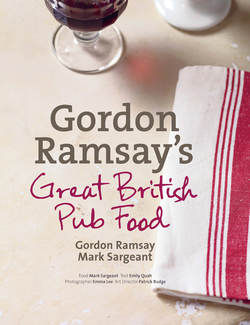Читать книгу Gordon Ramsay’s Great British Pub Food - Gordon Ramsay - Страница 15
TO SERVE
ОглавлениеHP brown sauce
A good Scotch egg is determined by the quality of the sausagemeat and the cooking. The egg should be cooked until the yolk has just set and there should be no sign of a dark ring around the yolk, which indicates that it is overcooked. These Scotch eggs can be made a couple of days in advance, but they are best enjoyed freshly cooked.
Bring a pan of water to the boil. Lower the eggs into the water and simmer for 8 minutes. Drain and cool under cold running water until the eggs no longer feel hot. Peel away the shells and set aside.
Put the sausagemeat into a bowl and add the parsley, sage, mustard powder, lemon zest and some seasoning. Mix together thoroughly, using one hand, then divide into 8 equal-sized balls. One at a time, flatten each sausagemeat ball on a piece of cling film to a circle, large enough to wrap around an egg. Place an egg in the middle, then draw up the ends of the cling film and massage the sausagemeat to cover the egg evenly. Repeat with the rest of the eggs and sausagemeat.
Have the flour, beaten eggs and breadcrumbs ready in three separate bowls. One at a time, roll each Scotch egg in the flour, then dip into the beaten egg and then into the breadcrumbs to coat. Dip into the egg and breadcrumbs once again for a really thorough coating. Repeat with the rest of the Scotch eggs.
Heat an 8cm depth of oil in a deep-fryer or heavy-based saucepan to 150°C. To test if it is ready for frying, drop a piece of bread into the oil; it should sizzle and turn light golden and crisp in less than a minute. Deep-fry the Scotch eggs two at a time. Lower them into the oil and fry for 4-5 minutes, turning once or twice to ensure they brown evenly.
Remove with a slotted spoon and drain on kitchen paper. Keep warm in a low oven while you fry the rest. Serve with HP sauce for dipping.
